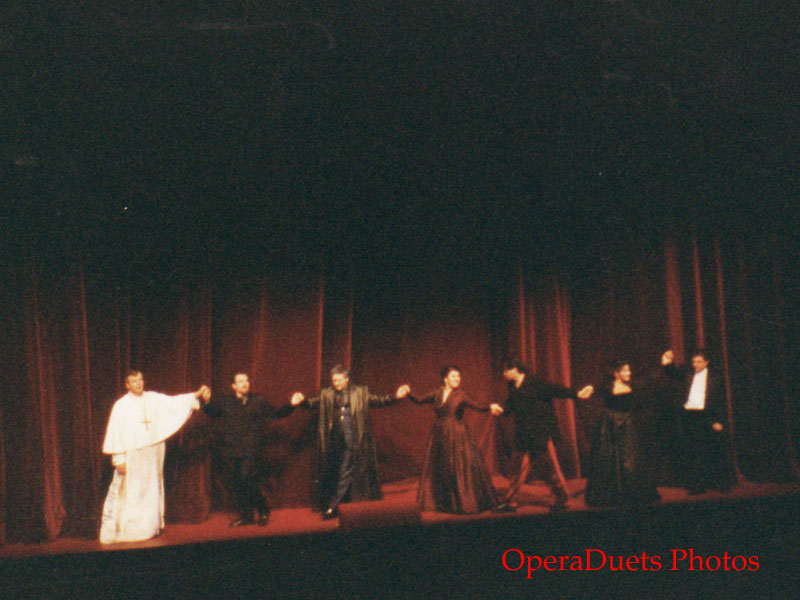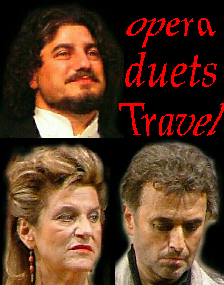
Voce dal cielo
Sen Guo: In the autodafé-scene, her voice is heard at the end of this scene, when the heretics are burnt, tortured. A lovely voice promises the poor tortured souls that heaven is open for them. Beautifully sung by this Chinese soprano.
Il Conte di Lerma
Leonardo Silva: Good.
La Contessa d'Aremberg
Susanne Merle: She is the one that is expelled from the Spanish court for not being together with the Queen at the meeting of Elisabeth & Don Carlo. The King in this way offend also the Queen. The Queen comforts her compatriot, she is not expelled from the heart of the Queen ("Non pianger, mia compagna"). Silent role. Tall, blond woman, skinny. An actress, or a just a member of the chorus.
Tebaldo
Judith Schmid: a trouser role for this Swiss mezzo. Walking and acting very much like a young man, which is her role. In this Zurich version it is Tebaldo who announces people coming in, and not the Count of Lerma like in the Salzburg 1986-version.Very good voice and acting.
La Principessa d'Eboli
Luciana d'Intino: this Italian mezzo is today's great Eboli. Amneris and so on. Her dark voice have an agility for coloratura even though her voice is a big one. And she even acts...All opera singers are supposed to act, but still some really can't do that and sing at the same time, Luciana has no problem with that. Onstage never for a second, is she not Eboli. Her passion, witty and loves clearly portrayed by Luciana d'Intino. Her song of the veil is great, and she is great in duos, trios and quartets, and her O don fatale is stupendous.
Elisabetta di Valois (Elisabeth de Valois, Queen of Spain)
Elena Prokina: great singing and acting by this Russian soprano. She does well her big aria in the end of the opera, Tu che le vanita, even though she doesn't quite have the big voice to really get it right. She is the Queen of this opera, regal in presence, and still gets the human side of Elisabeth to stand out like a real human being. The confrontation with the King, as a King's daughter she has greatness and is not easily intimidated. She shines, she acts very well with all the other members in the ensemble.
Un frate (The imperator Carlo Quinto?, Charles V)
Giuseppe Scorsin: the 3rd bass in Don Carlo. In this production we don't see him, we only hear him and the other monks at the monastery San Juste, in the beginning and the end of the opera. Good.
Il Grande Inquisitore
Pavel Daniluk: the 2nd bass. I have to say he does OK, I wonder if he lacks some of the deepest notes when he sings SiRe, it doesn't seem to go easily down. Good.?
Rodrigo, Marchese di Posa
Franco Vassallo: A really great Rodrigo sung and acted by this Milanese baritone. In flesh and blood real, but still a dreamer. GREAT!!!
Don Carlo (Don Carlos, Infante of Spain)
José Cura: Bravo, Cura! I don't understand how you do that, managing to play so perfectly a Don Carlo closer to the historical truth than we usually see, and still not break against Verdi's Don Carlos. Magic... Hard work.
Filippo II (Philip II of Spain)
Carlo Colombara: the 1rst bass of Don Carlo. An unhappy father and spouse. He has a misfit as son and a wife who never loved him. Great singing an acting by this bass.
Pier Giorgio Morandi and the orchestra....
He did a good job, Morandi, but still something the orchestra drowned the singers.
BRAVI tutti
Filippo II = Carlo Colombara
Don Carlo = José Cura
Rodrigo = Franco Vassallo
Il Grande Inquisitore = Pavel Daniluk
Un Frate = Giuseppe Scorsin
Elisabeth de Valois = Elena Prokina
La Principessa d'Eboli = Luciana D'Intino
Tebaldo = Judith Schmid
La Contessa d'Aremberg = Susanne Merle
Il Conte di Lerma = Leonardo Silva
Voce dal cielo = Sen Guo
Pier Giorgio Morandi, conductor
Inszenierung - Werner Düggelin
Bühnenbild - Raimund Bauer
Kostüme - Sue Willmington
Lichtgestaltung - Jürgen Hoffmann
Choreinstudierung - Ernst Raffelsberger

This page was last updated: June 20, 2022

